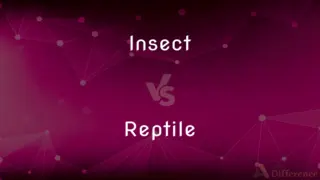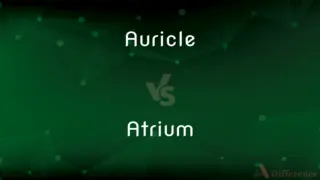Pedagogy vs. Didactic — What's the Difference?
By Tayyaba Rehman & Urooj Arif — Updated on April 26, 2024
Pedagogy refers to the methods and practices of teaching, especially as an academic subject or theoretical concept, while didactic relates to the intent to teach or instruct, often used to describe a moral or instructive message in literature.

Difference Between Pedagogy and Didactic
Table of Contents
ADVERTISEMENT
Key Differences
Pedagogy is the art or science of teaching and encompasses a broad range of educational theories and practices. Didactic, on the other hand, is an adjective describing materials or methods that are explicitly intended to teach or instruct, often focusing on moral instruction.
In academic contexts, pedagogy often explores various teaching strategies, educational psychology, and curriculum development aimed at enhancing learning. Whereas didactic is used to characterize the nature of something as instructional or educational, particularly in a manner that is overt and possibly perceived as preachy.
While pedagogy can apply to any educational setting, from elementary schools to university lectures, it is fundamentally about the approach to education. Didactic, however, often implies a direct, straightforward delivery of information or morals, commonly used in contexts like didactic poetry or literature where the intention is to convey a specific lesson or truth.
Pedagogy is deeply concerned with how teachers engage with students, adapt to different learning styles, and foster an environment conducive to learning. In contrast, didactic content might not consider the learner's preferences or engagement levels as much as it emphasizes the delivery of its intended message or lesson.
The effectiveness of pedagogical methods is frequently analyzed through educational research, which examines how well different approaches meet the learning needs of students. Didactic approaches, while also subjected to evaluation, are typically critiqued based on the clarity and impact of their moral or instructional messages.
ADVERTISEMENT
Comparison Chart
Definition
The art or science of teaching
Intended to teach or instruct
Focus
Teaching methods and practices
Moral or instructional content
Application
Educational settings
Literature, arts, and teaching
Engagement with Learners
High, tailored to learner needs
Low, more focused on content
Evaluation Criteria
Effectiveness in fostering learning
Clarity and impact of the message
Compare with Definitions
Pedagogy
Theories related to education and learning processes.
Modern pedagogy often emphasizes student-centered learning.
Didactic
Intended to convey instruction and information as well as pleasure and entertainment.
The museum's didactic programs are designed to educate visitors.
Pedagogy
The profession or principles of teaching.
His approach to pedagogy is highly respected among educators.
Didactic
Teaching or intending to teach a moral lesson.
The novel’s didactic elements underscore its theme of redemption.
Pedagogy
The method and practice of teaching, especially as an academic subject.
She is studying pedagogy to improve her teaching skills.
Didactic
As an educational doctrine, emphasizing instructional and informative qualities in literature and other types of art.
The didactic nature of the film made it an excellent educational tool.
Pedagogy
The study of how knowledge and skills are imparted in an educational context.
Pedagogy at the university level often involves a combination of lectures and seminars.
Didactic
Relating to teaching or intended for instruction.
The teacher used a didactic approach to ensure students understood the historical events.
Pedagogy
The strategies used by teachers to convey subject material.
Innovative pedagogy can include the use of technology in the classroom.
Didactic
Inclined to teach or lecture others too much.
His didactic tone was off-putting despite the clarity of his explanations.
Pedagogy
Pedagogy (), most commonly understood as the approach to teaching, is the theory and practice of learning, and how this process influences, and is influenced by, the social, political and psychological development of learners. Pedagogy, taken as an academic discipline, is the study of how knowledge and skills are imparted in an educational context, and it considers the interactions that take place during learning.
Didactic
Intended to teach, particularly in having moral instruction as an ulterior motive
A didactic novel that set out to expose social injustice
Pedagogy
The method and practice of teaching, especially as an academic subject or theoretical concept
Subject-based pedagogies
The relationship between applied linguistics and language pedagogy
Didactic
Intended to instruct.
Pedagogy
The art or profession of teaching.
Didactic
Morally instructive.
Pedagogy
Preparatory training or instruction.
Didactic
Inclined to teach or moralize excessively.
Pedagogy
The profession of teaching.
Didactic
Instructive or intended to teach or demonstrate, especially with regard to morality.
Didactic poetry
Pedagogy
The activities of educating, teaching or instructing.
Didactic
Excessively moralizing.
Pedagogy
The strategies or methods of instruction; an educational philosophy.
Didactic
(medicine) Teaching from textbooks rather than laboratory demonstration and clinical application.
Pedagogy
Pedagogics; pedagogism.
Didactic
(archaic) A treatise on teaching or education.
Pedagogy
The principles and methods of instruction
Didactic
Fitted or intended to teach; conveying instruction; preceptive; instructive; teaching some moral lesson; as, didactic essays.
The finest didactic poem in any language.
Pedagogy
The profession of a teacher;
He prepared for teaching while still in college
Pedagogy is recognized as an important profession
Didactic
Excessively prone to instruct, even those who do not wish to be instructed; - of people.
Pedagogy
The activities of educating or instructing or teaching; activities that impart knowledge or skill;
He received no formal education
Our instruction was carefully programmed
Good teaching is seldom rewarded
Didactic
A treatise on teaching or education.
Didactic
Instructive (especially excessively)
Common Curiosities
What is pedagogy?
Pedagogy is the study and theory of the methods and principles of teaching.
How does pedagogy impact student learning?
Good pedagogy improves student engagement and learning outcomes by adapting teaching methods to meet students’ needs.
What does didactic mean?
Didactic refers to something designed or intended to teach people, often focusing on moral lessons.
Why is understanding pedagogy important for teachers?
Understanding pedagogy helps teachers enhance their effectiveness by adopting teaching methods that suit various learning styles and environments.
Is didactic always negative?
While didactic can have a negative connotation if perceived as preachy, it is not inherently negative; it can be very effective in clearly presenting moral or educational content.
How are pedagogy and didactic used differently?
Pedagogy is used broadly in educational contexts to discuss teaching methods, while didactic is often used to describe content or a style that is overtly instructional.
Can a teaching method be both pedagogical and didactic?
Yes, a teaching method can be both pedagogical in its approach and didactic in its content, especially if it aims to instruct while considering educational theories.
What are examples of didactic literature?
Examples include fables and parables, which are specifically designed to teach moral lessons.
Can didactic be used in everyday conversation?
Yes, didactic can be used to describe any speech or text that aims to instruct or provide a lesson, even in casual conversation.
Is there a place for didactic methods in modern education?
Yes, didactic methods can be useful in situations where direct instruction and clarity are necessary, such as in safety training or moral education.
What is the difference between pedagogy and curriculum?
Pedagogy refers to the method of teaching, while curriculum refers to the content that is taught.
What is critical pedagogy?
Critical pedagogy is a philosophy of education that encourages students to question and challenge domination, and the beliefs and practices that dominate.
How can a teacher balance pedagogical and didactic approaches?
Teachers can balance these approaches by integrating direct instruction with interactive and student-centered learning strategies.
What should educators avoid in pedagogical approaches?
Educators should avoid methods that are overly rigid or do not accommodate diverse learning styles and needs.
How can didactic elements enhance a narrative?
Didactic elements can enhance a narrative by providing depth and teaching readers about particular life lessons or truths.
Share Your Discovery

Previous Comparison
Insect vs. Reptile
Next Comparison
Auricle vs. AtriumAuthor Spotlight
Written by
Tayyaba RehmanTayyaba Rehman is a distinguished writer, currently serving as a primary contributor to askdifference.com. As a researcher in semantics and etymology, Tayyaba's passion for the complexity of languages and their distinctions has found a perfect home on the platform. Tayyaba delves into the intricacies of language, distinguishing between commonly confused words and phrases, thereby providing clarity for readers worldwide.
Co-written by
Urooj ArifUrooj is a skilled content writer at Ask Difference, known for her exceptional ability to simplify complex topics into engaging and informative content. With a passion for research and a flair for clear, concise writing, she consistently delivers articles that resonate with our diverse audience.
















































